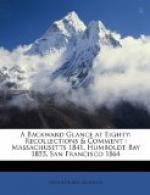At twenty-two I found myself Register of the Humboldt Land Office, with offices on the first floor of a building at Eureka, the second story of which was occupied by a school. An open veranda extended across the front. When I first let myself into the office, I carelessly left the key in the lock. A mischievous girl simply gave it a turn and I was a prisoner, with a plain but painful way of escape—not physically painful, but humiliating to my official pride. There was nothing for it but ignominiously to crawl out of the window onto the veranda and recover the key—and that I forthwith did.
The archives of the office proved interesting. The original Register was a Missouri Congressman, who had been instructed to proceed to Humboldt City and open the office. Humboldt City was on the map and seemed the logical location. But it had “died aborning” and as a city did not exist. So the Register took the responsibility of locating the office at Eureka, and in explanation addressed to the President, whom he denominated “Buckhannan,” a letter in which he went at length into the “hole” subject. The original draft was on file.
I was authorized to receive homestead applications, to locate land warrants, to hear contests, and to sell “offered land.” The latter was government land that had been offered for sale at $1.25 an acre and had not been taken. Strangely enough, it embraced a portion of the redwood belt along Mad River, near Arcata.
But one man seemed aware of the opportunity. John Preston, a tanner of Arcata, would accumulate thirty dollars in gold and with it buy fifty dollars in legal-tender notes. Then he would call and ask for the plat, and, after considerable pawing, he would say, “Well, Charlie, I guess I’ll take that forty.” Whereupon the transaction would be completed by my taking his greenbacks and giving him a certificate of purchase for the forty acres of timber-land that had cost him seventy-five cents an acre, and later probably netted him not less than three hundred dollars an acre for stumpage alone. Today it would be worth twice that. The opportunity was open to all who had a few cents and a little sense.
Sales of land were few and locations infrequent, consequently commissions were inconsiderable. Now and then I would hold a trial between conflicting claimants, some of them quite important. It was natural that the respective attorneys should take advantage of my youth and inexperience, for they had known me in my verdant boyhood and seemed to rejoice in my discomfiture. I had hard work to keep them in order. They threatened one another with ink-bottles and treated me with contempt. They would lure me on when I rejected evidence as inadmissible, offering slightly changed forms, until I was forced to reverse myself. When I was uncertain I would adjourn court and think it over. These were trying experiences, but I felt sure that the claimants’ rights would be protected on appeal to the Commissioner of the General Land Office and finally to the Secretary of the Interior. I was glad that in the biggest case I guessed right.




